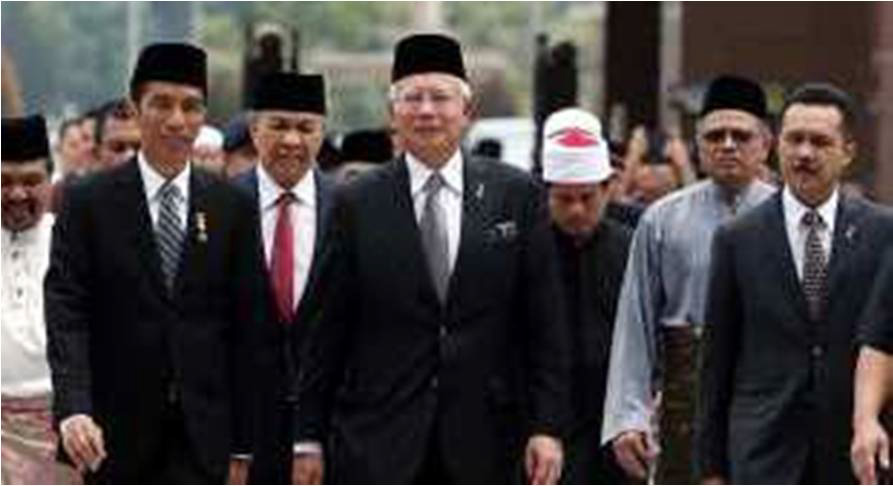MALAYSIA-INDONESIA TIES: Both countries want closer collaboration in political, economic and cultural spheres
There was a significant absence of public fanfare at the conclusion of President Joko (Jokowi) Widodo’s maiden visit to Malaysia, despite some interesting developments that took place not only during, but also in the immediate period preceding and following the visit itself.
Two days prior to Jokowi’s arrival, there appeared in Malaysian public space an ill-advised commercial advertisement with a demeaning reference to Indonesian maids working in Malaysia. Indonesians responded with emotive messages, some of which bordered on being full-blown hateful, targeting the irresponsible company, RoboVac. Those who had not escaped the generalisation trap conveniently blamed "Malaysia" and its entire people for this unnecessary incident.
Fortunately, the tension failed to build up beyond the minimum sabre-rattling observed on Facebook. Even major media stations, including the firebrand ones in Indonesia, largely marginalised the issue in their coverage. The Indonesian embassy (KBRI) in Malaysia should be credited for quelling the spark before it went ablaze. KBRI swiftly responded by requesting that RoboVac take down the ads and filing police reports over the misconduct. It also reported the incident to the Malaysian government and asked the latter to prevent similar incidents in the future.
Many anti-Malaysia/anti-Indonesia rhetoric and actions in the past have been the result of long-unresolved tension between the two countries. The RoboVac case showed the significance of timeliness in managing bilateral tension before an incident escalates into a major issue.
More importantly, there are indications, albeit symbolic, that the Malaysian and Indonesian governments understand the urgency to address bilateral tension before they can talk about cooperation.
Among the first things mentioned in the joint statement on the visit, issued on Feb 6, was that both governments had a huge desire to resolve the "long-standing issues" that sporadically destabilised relations.
Prime Minister Datuk Seri Najib Razak laid out several measures that both governments would pursue to tackle specific issues.
These include resolving maritime border disputes through consultation with a Technical Committee and special envoys; considering a "one-door policy" to standardise Indonesian workers’ entry into Malaysia’s workforce; and, allowing each government to pursue legal action against illegal fishermen.
Although these measures do not represent any substantive policy shift, they send out a strong signal that both countries want to resolve these issues as quickly as possible in moving towards closer collaboration in the political, economic and cultural spheres. A step in this direction would avoid a repeat in the future of the likely missed US$30 billion (RM107 billion) bilateral trade target this year.
Perhaps, the most interesting development of Jokowi’s visit was the signing of a memorandum of understanding (MoU) between Proton and PT Adiperkasa Citra Lestari (ACL), which was initially described by Proton officials as an initiative to develop Indonesia’s own national car.
The mere presence of Jokowi at the event was harshly criticised at home. At the outset, this was primarily due to the fact that the chief executive officer of ACL is Hendropriyono, former chief of Indonesia’s state intelligence agency and close associate of Megawati Soekarnoputri, Jokowi’s chief patron.
Critics claimed it was the latest sign of Jokowi succumbing to internal political pressures, which he had previously vowed to distance from during his presidential campaign.
The issue has since transitioned to the question of "Indonesia’s national car". Achieving that would grant Proton a lucrative chance to boost its business, yet, the process of getting there would see Jokowi throwing the full support of the Indonesian government to a project that critics claim would be headed by a company that has had a chequered success in the automobile industry.
Jokowi has subsequently denied this, referring, instead, to the MoU as a purely business-to-business matter between two companies. It should be noted, however, that Jokowi’s deflection was seen as a mere play of words, as opposed to outright denial. This has further tarnished his image at home, where people are starting to question the integrity of the president’s office.
Coupled with other urgent domestic issues, Jokowi might have to manage these problems first before he can fully commit to the undertakings agreed with the Malaysian government.
The question remains whether Jokowi’s inaugural visit to Malaysia will produce manifest policy outcomes, as opposed to empty rhetoric.
Though we should stay hopeful, it might take a longer time for the results to materialise than what both sides expect.
This article first appeared in New Straits Times on 17 February 2015.





